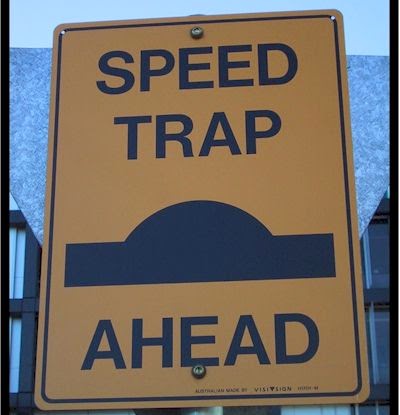Practicing the Theory of Equality
My daily commute is usually 45 minutes each way. I cross
over three towns each time I go to or from work. Having spent more than half of
my adult life in Los Angeles this is not an unusual or odd pattern for me. For
many Bostonians whom I interact with it’s a very odd way to choose to live.
Like clockwork at the end of each month I see a high visibility of police on
the streets – strategically positioned to capture anybody who deviates from one
of a myriad of rules of the road. My libertarian philosophy usually kicks into
annoyance for the effort seems to be less about maintaining a strict adherence
to the laws and more about a quota or generating fines. I haven’t been a victim
of such calibrated enforcement here (yet) so my feelings are theoretical and
not practical. (If it’s about safety then why wouldn't they be there 24/7, not just the last few
days of the month?) It’s a nice position to be in – thinking about and
commenting on a police matter when one doesn’t have any direct experience...then it's theoretical. People in Baltimore, Ferguson and many other places don’t have that same luxury.
I’m a white man, educated, older person who is able to make
ends meet. Those adjectives make me privileged though I don’t think of myself
that way. When I see the riots and violence in Baltimore, Ferguson … even New
York … I can’t identify with why somebody would do that. What does torching a
police car, or looting a business do to tackle racism? Why does damaging property somehow equate to acceptable discord? Intellectually I can
absolutely understand that years of oppression, discrimination, abuse and unequal
treatment boils over and it’s a way of acting out in response to events. My own community (LGBT) was largely born from its own demonstrations, so it's not that I can't comprehend, I just can't personally identify. The events that have caused such actions recently have been when a black person has died at the
hands of a non-black police officer.
There are no official statistics available by state or
nationally about how many people die at the hands of police officers. The U.K.’s
Guardian published a 2-part story in March 2015 which found that “citizen activists keep
the best national counts.” The story reported that an African American is
killed by a police or security guard “at least every 28 hours.”
The Justice Department’s report on Ferguson determined that
the police were issuing 28 tickets a month to citizens where 80% of the
residents are African American. CNN’s report summarizes a number of cases where the ticketing was so much a part of the
culture that the entire city budget was framed around increasing fines to its
citizens.
My smaller-government philosophy would love to grab onto these
facts as evidence that there are too many laws on the books, too many fines,
too much government intrusion! An example from the CNN story: A woman received tickets
because her car was not parked in her own driveway in accordance with the city’s
rules. The fines added up. She fought them. Was arrested. Then lost because she
couldn’t contest the ruling because she was in jail. In theory streamlining the
laws and fine structure would mitigate this situation, but the larger issues
aren’t actually about the law. It’s about how Americans interact with each
other.
There is a pervasive unresolved issue in America around
race. It divides our communities and infects our politics. I am a white person
of privilege and absolutely the wrong person to be pontificating about race. I loathe
drawing summary conclusions from bits of data and applying it. Those cautionary
statements aside: I’m confident that if somebody like me was being killed
virtually every single day by the police there would be a lot more fuss about
it. If a community had 80% of people who were like me and were being harassed and
fined like in Ferguson that it wouldn’t be tolerated.
I have no answers. I don't have daily interactions that require me to have answers, or even suggestions. I pray for understanding, I pray for healing and I
pray that we practice the theory of equality a lot better than we do.





Comments
Post a Comment